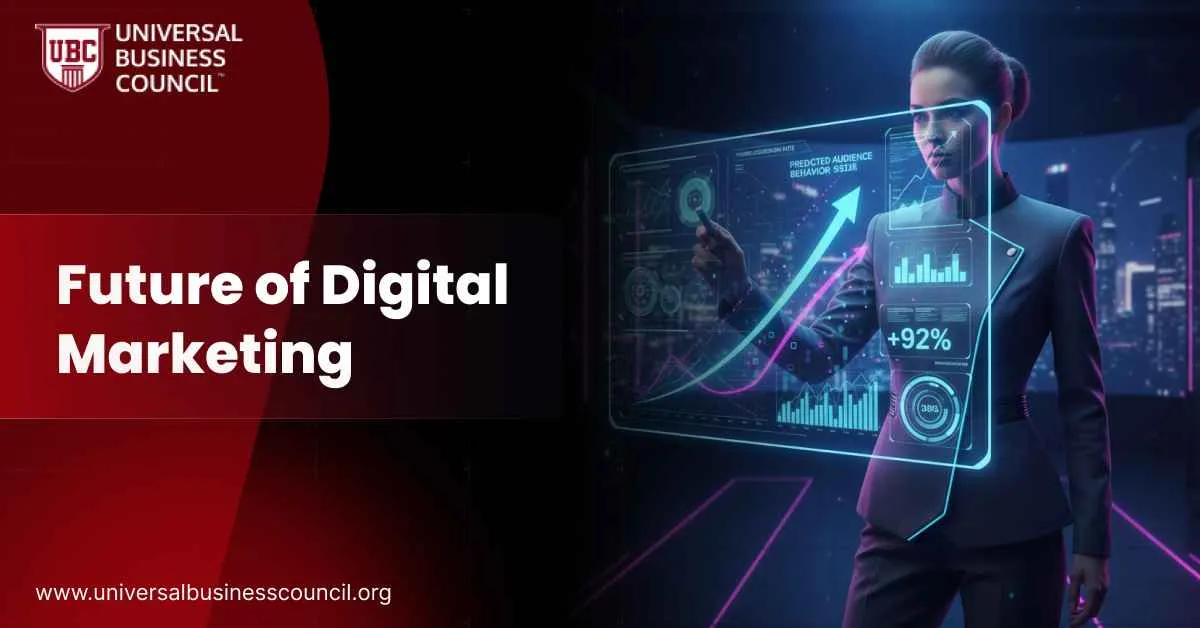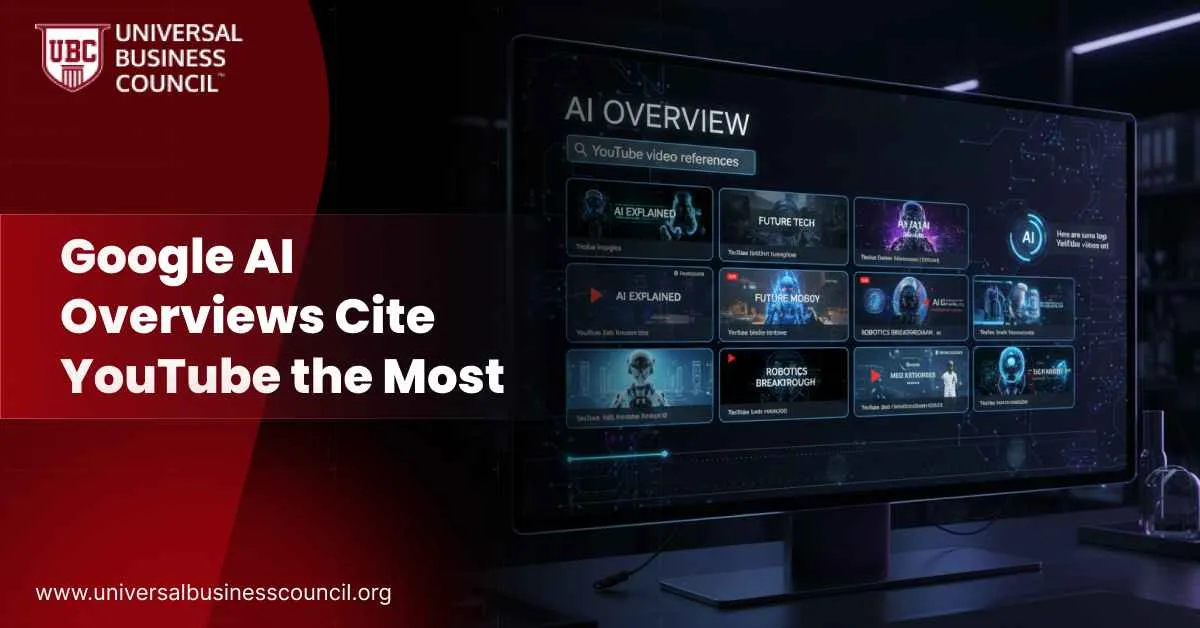 The future of digital marketing is being shaped by artificial Intelligence, privacy-first data systems, and smarter customer experiences. As we move into 2025 and beyond, the focus is shifting from growing budgets to growing efficiency. Companies are expected to do more with less while staying ethical, creative, and data-driven.
Marketing is no longer about pushing messages to audiences. It’s about understanding intent, predicting behavior, and personalizing every interaction. Businesses that can blend creativity with technology will dominate the next wave of growth. Professionals preparing for this shift can strengthen their foundation by joining an AI Powered Digital Marketing Program to learn how automation and analytics drive modern marketing success.
The future of digital marketing is being shaped by artificial Intelligence, privacy-first data systems, and smarter customer experiences. As we move into 2025 and beyond, the focus is shifting from growing budgets to growing efficiency. Companies are expected to do more with less while staying ethical, creative, and data-driven.
Marketing is no longer about pushing messages to audiences. It’s about understanding intent, predicting behavior, and personalizing every interaction. Businesses that can blend creativity with technology will dominate the next wave of growth. Professionals preparing for this shift can strengthen their foundation by joining an AI Powered Digital Marketing Program to learn how automation and analytics drive modern marketing success.
What Will Change in the Next 12 to 24 Months
The next two years will bring a major transformation in how marketers plan and execute campaigns. Budgets will stay tight, but expectations will rise. According to recent industry studies, the average marketing budget in 2025 accounts for about 7.7% of total company revenue. This means teams must use every dollar wisely.
Efficiency will become the new growth strategy. Brands will prioritize productivity tools and measurable performance over experimental spending. The biggest shift will come from how artificial Intelligence, data privacy, and omnichannel marketing interact.
Marketers who want to build long-term resilience can explore the Deep Tech Certification
from Blockchain Council. It offers insights into the advanced technologies that power data security and transparency in digital ecosystems.
How AI Will Power Campaigns and Content
Artificial Intelligence is no longer just a buzzword. It has become a built-in part of marketing operations. In 2025, companies are using AI agents to generate content, run A/B tests, track customer sentiment, and even respond to queries in real time.
AI-driven personalization has reached a new level. Tools can analyze browsing behavior, purchase history, and engagement patterns to deliver highly tailored experiences. The key advantage is speed and scale — campaigns that once took weeks can now be launched in hours.
However, successful AI adoption requires ethical and human oversight. Businesses must ensure transparency when using AI-generated ads or messages. Consumers should always know when content has been created or influenced by algorithms.
Marketers who wish to understand the balance between automation and human creativity can benefit from a Tech Certification
by Global Tech Council. It helps professionals master the principles of AI governance and responsible use in digital marketing systems.
What Privacy Shifts Mean for Measurement and ROI
Privacy is transforming how marketers collect and measure data. The phase-out of third-party cookies means advertisers can no longer rely on traditional tracking methods. Instead, first-party data — information gathered directly from users — will become the foundation of all marketing strategies.
Google’s Privacy Sandbox initiative introduces new APIs for ad targeting and measurement that protect user privacy while maintaining advertising efficiency. Marketers must adapt to these systems and invest in clear consent experiences that explain data collection practices openly.
The ability to model conversions, measure performance through clean rooms, and respect universal opt-out signals will define the most trustworthy brands. Ethical data use not only prevents legal risks but also increases loyalty by building customer confidence.
The Marketing and Business Certification
from Universal Business Council helps marketers understand privacy-compliant strategies and integrate ethical frameworks into their campaign designs.
Where Social and Community Marketing Are Heading
Social media is evolving from mass reach to meaningful connection. Platforms like Instagram, LinkedIn, and TikTok now reward authenticity and community over viral trends. Hootsuite’s 2025 report highlights that engagement rates now average between 1.4% and 2.8%, making community relevance more important than follower counts.
In the coming years, marketers will shift from posting more to posting smarter. Niche audiences, micro-influencers, and interactive content such as polls and live sessions will drive real engagement. Social discovery — using social platforms as search tools — will continue to grow, especially among younger generations.
To stay ahead, brands must build strong communities where users share experiences, not just react to ads. Listening tools, real-time engagement dashboards, and creator collaborations will remain essential for success.
How Retail Media Will Influence Budgets and Creative
Retail media — ads that appear directly within e-commerce and retailer websites — has become one of the fastest-growing channels in digital marketing. Giants like Amazon, Walmart, and Instacart dominate the space, but smaller networks are emerging rapidly.
This channel gives brands the power to reach shoppers closer to the point of purchase, making it highly effective for conversions. However, success in retail media requires consistent product data, accurate targeting, and creative testing.
Budget allocation is also shifting. As brands invest more in retail search and shoppable formats, they must maintain balance across other marketing channels. Incrementality testing — measuring how much additional value a campaign adds — will be critical to justify ad spend.
Retail media will also evolve to support cross-platform measurement, where campaigns in social and retail environments are tracked under one performance framework. The integration of AI agents will further automate product recommendations and keyword optimization for retailers.
How Voice, Visual, and Search Are Evolving
The concept of “search” is expanding beyond Google. Consumers are now using social apps, e-commerce platforms, and voice assistants as search engines. People ask questions directly to Siri, Alexa, and Google Assistant instead of typing them.
This change requires marketers to optimize for conversational keywords and structured data. Visual search — where users upload an image to find similar products — is also becoming popular. Retail and fashion brands, in particular, are investing in image recognition to match customer intent instantly.
In the future, SEO will rely less on keywords and more on context. Search engines and AI models will analyze user intent, tone, and preferences to serve dynamic results. Businesses that build strong entity-based SEO strategies will see higher visibility across platforms.
How Content and Creators Will Shape the Next Decade
Content remains king, but the way it’s produced and consumed is changing. Short-form video continues to dominate, yet long-form storytelling through podcasts, newsletters, and brand documentaries is making a comeback.
Creator marketing is also maturing. Brands are moving from one-time collaborations to long-term partnerships with influencers who share their values. Authentic storytelling, community co-creation, and data-backed insights will define successful content strategies.
AI tools will support creators by generating ideas, scripting drafts, and analyzing audience sentiment. However, the human touch — empathy, humor, and originality — will always remain irreplaceable.
Professionals who want to combine creative vision with data-driven insights can build strong skills through the AI Digital Marketing Course, which provides practical exposure to AI tools used in campaign design and storytelling.
What Skills Do Marketers Need to Stay Ahead
The digital marketing industry is evolving faster than ever. To stay competitive, professionals must expand their technical and strategic skill sets. The most in-demand capabilities include:
- AI literacy and automation tools – Understanding how to use machine learning for personalization and analytics.
- Data storytelling – Turning complex metrics into actionable narratives for stakeholders.
- Privacy compliance knowledge – Keeping up with global data protection laws.
- Omnichannel marketing strategy – Managing campaigns across social, search, and retail simultaneously.
- Ethical communication – Ensuring all marketing actions align with transparency and fairness.
Continuous learning is the best investment in a marketer’s career. Enrolling in certifications like the Deep Tech Certification
from Blockchain Council or the Tech Certification
from Global Tech Council ensures that professionals understand both the technology and the ethics shaping the next generation of marketing.
What Challenges Will Marketers Face
The future of digital marketing is filled with opportunity, but it also brings challenges that require preparation and adaptability.
- Limited budgets and higher expectations: Companies are demanding better ROI from smaller marketing teams.
- Data fragmentation: With multiple platforms and privacy rules, collecting consistent data is getting harder.
- Ethical pressure: Transparency in AI, consent, and ad disclosure will be closely monitored.
- Talent shortage: The rapid pace of technology requires constant upskilling across marketing teams.
- Algorithm volatility: Frequent changes in platform algorithms can disrupt visibility and campaign performance.
By approaching these challenges strategically, marketers can turn them into opportunities for innovation and growth.
Will AI replace human marketers?
AI will automate repetitive tasks but will not replace human creativity or empathy. The future belongs to marketers who can collaborate with AI to produce faster and smarter campaigns.
What will happen when cookies disappear completely?
Marketers will depend on first-party data, consent-based marketing, and privacy-friendly APIs such as Google’s Privacy Sandbox. Transparency will be the key to maintaining user trust.
How can small businesses compete with large brands?
Smaller businesses can succeed by focusing on niche communities, using social platforms for engagement, and optimizing for local SEO. Ethical, authentic marketing creates strong brand loyalty.
What’s the future of influencer marketing?
Influencer marketing will move toward long-term brand partnerships. Authenticity, disclosure, and audience alignment will define success more than follower count.
How can professionals stay updated with industry changes?
Continuous education through online programs and certifications is essential. The Marketing and Business Certification
from Universal Business Council helps professionals lead marketing transformation in a privacy-first and AI-driven world.
Conclusion
The future of digital marketing is intelligent, ethical, and experience-driven. It combines automation with human creativity, data privacy with personalization, and technology with purpose. Businesses that adapt to these trends early will define the next era of brand engagement.
The next generation of marketers will not just sell products. They will build relationships, protect privacy, and use technology to make marketing more human.
 The future of digital marketing is being shaped by artificial Intelligence, privacy-first data systems, and smarter customer experiences. As we move into 2025 and beyond, the focus is shifting from growing budgets to growing efficiency. Companies are expected to do more with less while staying ethical, creative, and data-driven.
Marketing is no longer about pushing messages to audiences. It’s about understanding intent, predicting behavior, and personalizing every interaction. Businesses that can blend creativity with technology will dominate the next wave of growth. Professionals preparing for this shift can strengthen their foundation by joining an AI Powered Digital Marketing Program to learn how automation and analytics drive modern marketing success.
The future of digital marketing is being shaped by artificial Intelligence, privacy-first data systems, and smarter customer experiences. As we move into 2025 and beyond, the focus is shifting from growing budgets to growing efficiency. Companies are expected to do more with less while staying ethical, creative, and data-driven.
Marketing is no longer about pushing messages to audiences. It’s about understanding intent, predicting behavior, and personalizing every interaction. Businesses that can blend creativity with technology will dominate the next wave of growth. Professionals preparing for this shift can strengthen their foundation by joining an AI Powered Digital Marketing Program to learn how automation and analytics drive modern marketing success.




Leave a Reply